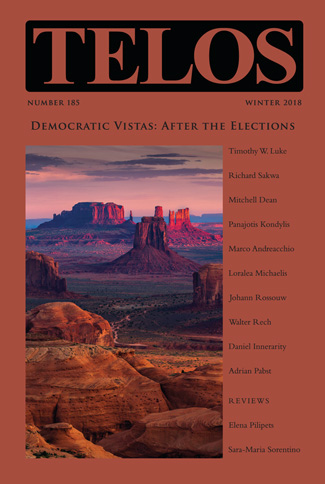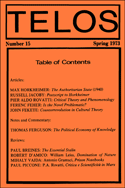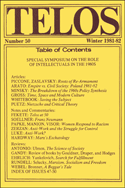By Loralea Michaelis · Monday, February 25, 2019 Loralea Michaelis’s “Temporality and Revolution in Horkheimer’s Early Critical Theory: A Luxemburgian Reading of Dämmerung” appears in Telos 185 (Winter 2018). Read the full article at the Telos Online website, or purchase a print copy of the issue in our online store. Individual subscriptions to Telos are available in both print and online formats.
 This article challenges the related assumptions about temporality and the significance of success and failure for revolutionary activism that have governed the standard interpretation of Horkheimer’s critical theory as foundering on the disappointment of its early revolutionary expectations. The early influence of Luxemburg on Horkheimer is used to bring into clearer focus Horkheimer’s handling of the problem of a failed revolution in Dämmerung, his earliest published work, which bears a striking resemblance to Luxemburg’s own positions on the centrality of failure to the development of the revolution as well as her critique of the success-oriented politics of reformism. Dämmerung foregrounds the German revolution of 1919–23, but the working through of its failure yields not pessimism over the future but a challenge to the preoccupation with future prospects which underlies both pessimism and optimism; it also yields a conception of revolution as a present-oriented resistance that not only does not expect to succeed in its aims but regards the aim of success with a skeptical eye. Contrary to the standard reading, the failed revolution is not a problem for which Horkheimer’s early critical theory needs to find a solution; rather, it is its practical correlative. This article challenges the related assumptions about temporality and the significance of success and failure for revolutionary activism that have governed the standard interpretation of Horkheimer’s critical theory as foundering on the disappointment of its early revolutionary expectations. The early influence of Luxemburg on Horkheimer is used to bring into clearer focus Horkheimer’s handling of the problem of a failed revolution in Dämmerung, his earliest published work, which bears a striking resemblance to Luxemburg’s own positions on the centrality of failure to the development of the revolution as well as her critique of the success-oriented politics of reformism. Dämmerung foregrounds the German revolution of 1919–23, but the working through of its failure yields not pessimism over the future but a challenge to the preoccupation with future prospects which underlies both pessimism and optimism; it also yields a conception of revolution as a present-oriented resistance that not only does not expect to succeed in its aims but regards the aim of success with a skeptical eye. Contrary to the standard reading, the failed revolution is not a problem for which Horkheimer’s early critical theory needs to find a solution; rather, it is its practical correlative.
Continue reading →
By Thorsten Fuchshuber · Thursday, March 24, 2016 If we want to gain a deeper understanding of the specific relationship between the ethical and the political in current times, we have to talk about the mediating agencies that enable this relationship. And if what the announcement for the Telos Conference 2016 in New York states were really true, namely, that at “the theoretical level, political reality has come to be seen as divorced from ethical life,” we need to ask: what has happened to these mediating agencies? That is exactly what the German philosopher Max Horkheimer was doing with his racket theory. He never explicitly referenced the “ethical” as a philosophical category. Yet he was able to show that in post-liberal societies, the social instances that made the relationship between the political and the ethical possible in the first place, are being destroyed—or they are at least tending towards a loss of their reflexive function. For Horkheimer this is at the core of what he called the racket society: that ultimately, every reference to universality and to society, or in German to the Allgemeinheit, is lost.
Continue reading →
By Lewis West · Friday, February 27, 2015  In November 1939, gangs of German civilians and Nazi operatives stormed Jewish stores, synagogues, and homes, killing or arresting those who could not escape. The Nazi leadership had carefully planned the assault—Kristallnacht would become only one among many instances of unimaginable horror. In the coming years, the Nazis proceeded to murder thousands of disabled Germans; when Germany invaded Russia, groups of special units—known as Einsatzgruppen—followed closely behind the German army, liquidating Jews, Communists, and Roma.[1] By 1942, the Nazi death camps had initiated yet another gruesome and terrifying phase of the Reich’s program of anti-Semitism and racial purity.[2] In November 1939, gangs of German civilians and Nazi operatives stormed Jewish stores, synagogues, and homes, killing or arresting those who could not escape. The Nazi leadership had carefully planned the assault—Kristallnacht would become only one among many instances of unimaginable horror. In the coming years, the Nazis proceeded to murder thousands of disabled Germans; when Germany invaded Russia, groups of special units—known as Einsatzgruppen—followed closely behind the German army, liquidating Jews, Communists, and Roma.[1] By 1942, the Nazi death camps had initiated yet another gruesome and terrifying phase of the Reich’s program of anti-Semitism and racial purity.[2]
Continue reading →
By Dirk Braunstein · Wednesday, August 27, 2014 An article by Hamid Dabashi recently appeared in the online version of the English-language edition of Al Jazeera. Dabashi teaches Iranian Studies and Comparative Literature at Columbia University, where the exiled Frankfurt School thinkers Max Horkheimer and Theodor Adorno found refuge during the period of National Socialism. Dabashi quotes Adorno’s 1949 thesis that it is barbaric to write poetry after Auschwitz and asks what it really means: “How could writing poetry after a calamity such as Auschwitz, and by extension a horror like the Holocaust, be something barbaric? Doesn’t poetry console in moments of mourning and despair?”
Continue reading →
By J. F. Dorahy · Tuesday, April 16, 2013 As an occasional feature on TELOSscope, we highlight a past Telos article whose critical insights continue to illuminate our thinking and challenge our assumptions. Today, J. F. Dorahy looks at Joel Whitebook’s “Saving the Subject: Modernity and the Problem of the Autonomous Individual,” from Telos 50 (Winter 1981).
 Autonomy is, arguably, the most fundamental concept in the discursive constellation of modernity. If it is apposite, and I believe it is, to think in terms of the differentiation between political, socio-economic, and cultural modernities, then it is clear that the concept of autonomy—either with reference to the autonomous individual or the autonomous work of art—is a constitutive force within each sphere. In “Saving the Subject: Modernity and the Problem of the Autonomous Individual,” Joel Whitebook offers a historically nuanced overview of the difficulties involved in thinking the “autonomous individual” under the conditions of a dynamic and increasingly complex modernity. Whitebook’s piece is wide-ranging and fuses a deep psychoanalytic insight with a robust sociological consciousness: a fusion that accompanies, to my mind, the best critical theory. To be sure, the many subtleties and divergences that emerge from Whitebook’s dialectic are resistant to a full reconstruction within this preview. Rather, I would like to simplify Whitebook’s account by drawing out the three historical epochs examined by Whitebook and say a few things regarding the key aspects of Whitebook’s reading of Marx and Freud and Adorno and Habermas as thinkers who most significantly appreciate the problematic nature of the modern, autonomous individual. Finally, I conclude by arguing for the innovative character of Whitebook’s thoughts regarding the centrality of affective relationships in the formation of the autonomous individual. Autonomy is, arguably, the most fundamental concept in the discursive constellation of modernity. If it is apposite, and I believe it is, to think in terms of the differentiation between political, socio-economic, and cultural modernities, then it is clear that the concept of autonomy—either with reference to the autonomous individual or the autonomous work of art—is a constitutive force within each sphere. In “Saving the Subject: Modernity and the Problem of the Autonomous Individual,” Joel Whitebook offers a historically nuanced overview of the difficulties involved in thinking the “autonomous individual” under the conditions of a dynamic and increasingly complex modernity. Whitebook’s piece is wide-ranging and fuses a deep psychoanalytic insight with a robust sociological consciousness: a fusion that accompanies, to my mind, the best critical theory. To be sure, the many subtleties and divergences that emerge from Whitebook’s dialectic are resistant to a full reconstruction within this preview. Rather, I would like to simplify Whitebook’s account by drawing out the three historical epochs examined by Whitebook and say a few things regarding the key aspects of Whitebook’s reading of Marx and Freud and Adorno and Habermas as thinkers who most significantly appreciate the problematic nature of the modern, autonomous individual. Finally, I conclude by arguing for the innovative character of Whitebook’s thoughts regarding the centrality of affective relationships in the formation of the autonomous individual.
Continue reading →
|
|
 This article challenges the related assumptions about temporality and the significance of success and failure for revolutionary activism that have governed the standard interpretation of Horkheimer’s critical theory as foundering on the disappointment of its early revolutionary expectations. The early influence of Luxemburg on Horkheimer is used to bring into clearer focus Horkheimer’s handling of the problem of a failed revolution in Dämmerung, his earliest published work, which bears a striking resemblance to Luxemburg’s own positions on the centrality of failure to the development of the revolution as well as her critique of the success-oriented politics of reformism. Dämmerung foregrounds the German revolution of 1919–23, but the working through of its failure yields not pessimism over the future but a challenge to the preoccupation with future prospects which underlies both pessimism and optimism; it also yields a conception of revolution as a present-oriented resistance that not only does not expect to succeed in its aims but regards the aim of success with a skeptical eye. Contrary to the standard reading, the failed revolution is not a problem for which Horkheimer’s early critical theory needs to find a solution; rather, it is its practical correlative.
This article challenges the related assumptions about temporality and the significance of success and failure for revolutionary activism that have governed the standard interpretation of Horkheimer’s critical theory as foundering on the disappointment of its early revolutionary expectations. The early influence of Luxemburg on Horkheimer is used to bring into clearer focus Horkheimer’s handling of the problem of a failed revolution in Dämmerung, his earliest published work, which bears a striking resemblance to Luxemburg’s own positions on the centrality of failure to the development of the revolution as well as her critique of the success-oriented politics of reformism. Dämmerung foregrounds the German revolution of 1919–23, but the working through of its failure yields not pessimism over the future but a challenge to the preoccupation with future prospects which underlies both pessimism and optimism; it also yields a conception of revolution as a present-oriented resistance that not only does not expect to succeed in its aims but regards the aim of success with a skeptical eye. Contrary to the standard reading, the failed revolution is not a problem for which Horkheimer’s early critical theory needs to find a solution; rather, it is its practical correlative.  In November 1939, gangs of German civilians and Nazi operatives stormed Jewish stores, synagogues, and homes, killing or arresting those who could not escape. The Nazi leadership had carefully planned the assault—Kristallnacht would become only one among many instances of unimaginable horror. In the coming years, the Nazis proceeded to murder thousands of disabled Germans; when Germany invaded Russia, groups of special units—known as Einsatzgruppen—followed closely behind the German army, liquidating Jews, Communists, and Roma.[1] By 1942, the Nazi death camps had initiated yet another gruesome and terrifying phase of the Reich’s program of anti-Semitism and racial purity.[2]
In November 1939, gangs of German civilians and Nazi operatives stormed Jewish stores, synagogues, and homes, killing or arresting those who could not escape. The Nazi leadership had carefully planned the assault—Kristallnacht would become only one among many instances of unimaginable horror. In the coming years, the Nazis proceeded to murder thousands of disabled Germans; when Germany invaded Russia, groups of special units—known as Einsatzgruppen—followed closely behind the German army, liquidating Jews, Communists, and Roma.[1] By 1942, the Nazi death camps had initiated yet another gruesome and terrifying phase of the Reich’s program of anti-Semitism and racial purity.[2]  Autonomy is, arguably, the most fundamental concept in the discursive constellation of modernity. If it is apposite, and I believe it is, to think in terms of the differentiation between political, socio-economic, and cultural modernities, then it is clear that the concept of autonomy—either with reference to the autonomous individual or the autonomous work of art—is a constitutive force within each sphere. In “Saving the Subject: Modernity and the Problem of the Autonomous Individual,” Joel Whitebook offers a historically nuanced overview of the difficulties involved in thinking the “autonomous individual” under the conditions of a dynamic and increasingly complex modernity. Whitebook’s piece is wide-ranging and fuses a deep psychoanalytic insight with a robust sociological consciousness: a fusion that accompanies, to my mind, the best critical theory. To be sure, the many subtleties and divergences that emerge from Whitebook’s dialectic are resistant to a full reconstruction within this preview. Rather, I would like to simplify Whitebook’s account by drawing out the three historical epochs examined by Whitebook and say a few things regarding the key aspects of Whitebook’s reading of Marx and Freud and Adorno and Habermas as thinkers who most significantly appreciate the problematic nature of the modern, autonomous individual. Finally, I conclude by arguing for the innovative character of Whitebook’s thoughts regarding the centrality of affective relationships in the formation of the autonomous individual.
Autonomy is, arguably, the most fundamental concept in the discursive constellation of modernity. If it is apposite, and I believe it is, to think in terms of the differentiation between political, socio-economic, and cultural modernities, then it is clear that the concept of autonomy—either with reference to the autonomous individual or the autonomous work of art—is a constitutive force within each sphere. In “Saving the Subject: Modernity and the Problem of the Autonomous Individual,” Joel Whitebook offers a historically nuanced overview of the difficulties involved in thinking the “autonomous individual” under the conditions of a dynamic and increasingly complex modernity. Whitebook’s piece is wide-ranging and fuses a deep psychoanalytic insight with a robust sociological consciousness: a fusion that accompanies, to my mind, the best critical theory. To be sure, the many subtleties and divergences that emerge from Whitebook’s dialectic are resistant to a full reconstruction within this preview. Rather, I would like to simplify Whitebook’s account by drawing out the three historical epochs examined by Whitebook and say a few things regarding the key aspects of Whitebook’s reading of Marx and Freud and Adorno and Habermas as thinkers who most significantly appreciate the problematic nature of the modern, autonomous individual. Finally, I conclude by arguing for the innovative character of Whitebook’s thoughts regarding the centrality of affective relationships in the formation of the autonomous individual. 

